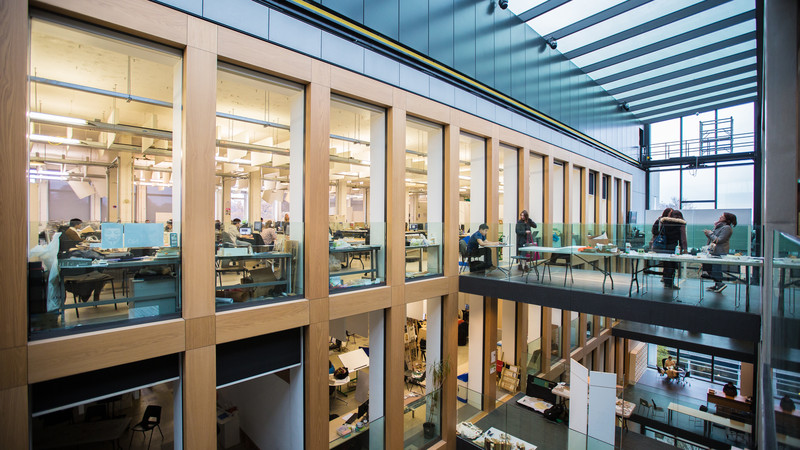Becoming an architect is an exciting journey. Oxford School of Architecture offers different routes to qualification, encouraging a diverse range of people from a variety of cultural, social and educational backgrounds to follow their career aspirations. And, shaped by our studio culture and passion for sustainability, we offer a number of ways that you can experiment, develop and specialise, both during and after qualification.
Courses
We offer a number of routes to becoming an architect along with opportunities to develop and specialise.
To become a qualified architect in the UK, students must complete a three-part qualification process accredited by the Architects Registration Board (ARB) and the Royal Institute of British Architects (RIBA):
Part 1 - BA (Hons) Architecture introduces you to architectural design, representation and technology, with a focus on understanding construction principles and developing your skills in drawing and modeling.
BA (Hons) Interior Architecture explores the adaptive reuse and transformation of existing spaces, blending architecture, design and social context. You’ll develop creative and technical skills to design sustainable, functional, and innovative interior environments.
Followed by two years in professional practice.
Part 2 - MArchD Applied Design in Architecture is a research-led course exploring innovative architectural design, technology and professional practice. It provides you with the critical and creative skills needed for ARB/RIBA Part 2 qualification.
Part 3 - Examination in Practice and Management is the final qualification for aspiring architects, assessing your professional competence, legal knowledge and project management skills required for professional registration with the ARB and RIBA.
After completing Part 3, you can apply for registration with the ARB and become chartered architects with the RIBA.

- The RIBA Studio programme route to becoming an architect enables you to work full-time in practice while studying part-time.
The RIBA Foundation programme supports you to develop your first design portfolio and gain your first experiences in practice. The RIBA Certificate (Part 1) and Diploma (Part 2) qualifications are completed under the supervision of an architect where they are employed.
Oxford School of Architecture offers a range of specialist architecture courses that focuses on interior architecture, sustainability, digital innovation and humanitarian practice. With an emphasis on practical application and research-led learning, these courses equip you with expertise in emerging architectural fields, preparing you to tackle global challenges in sustainable architecture, responsible design and disaster recovery.
MArch Advanced Architectural Design develops your advanced architectural design skills, emphasising practical work and encouraging you to produce artifacts, films, installations or detailed investigations.
MA Interior Architecture focuses on the reuse and adaptation of existing buildings, merging architecture, interior design and social science.
MSc Sustainable Architecture: Evaluation and Design emphasises sustainable design principles, preparing you to create environmentally responsible architectural solutions.
MA Digital Craft in Architecture explores the intersection of digital technology and traditional craftsmanship in architectural design.
MA/PGCert Humanitarian Action and Peacebuilding equips you with the knowledge and skills to address conflict resolution, humanitarian response and post-conflict recovery. It combines theory with practical application preparing graduates for careers in peacebuilding, human rights and international aid.
MA/PGDip/PGCert Global Development and Humanitarian Practice focuses on international development and humanitarian aid, exploring global challenges, policy-making and sustainable development. You’ll gain practical and analytical skills for careers in NGOs, government agencies and international organisations.
For urban design, construction, real estate, property development and planning courses, please visit the School of the Built Environment pages.

